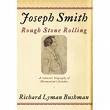
I started a new Mormon history book. It is Jospeh Smith: Rough Rolling Stone by Richard Bushman. It is a examination of the cultural environment in which Joseph grew up, and how it prepared him for the various rolls he took on through his life. It also looks at how Joseph differed from the other visionaries from the same period. For example, the common path to prophethood was to preach, and gather a following. Joseph's path did not include any preaching. He wasn't really that good at it, until later in his life. At the founding meeting of the Mormon church there wasn't even a sermon delivered.
Another example was The First Vision. The account described in the Pearl of Great Price was not the only version. The story changed over time. Bushman deftly explains this by the change in meaning it had based on the rolls Joseph took on through out his life. When he was very young, the primary purpose of the first vision was for the forgiveness of sins. Later, as he came to understand that he was to be a prohet, he saw the first vision in a different light (no pun intended). He saw it as the begining of his roll as visionary. So his explanation of the event changed. If I were to explain a pivotal moment in my life I'm sure the description might change as I grew to understand ultimate results of my choices.
The tone of the book is generally sympathetic. But the understanding of the book does not require acceptance of his claims, only an acceptance that he made the claims and that people believed him.
Bushman is the Chair of Mormon studies at Claremont University in southern California.
Another example was The First Vision. The account described in the Pearl of Great Price was not the only version. The story changed over time. Bushman deftly explains this by the change in meaning it had based on the rolls Joseph took on through out his life. When he was very young, the primary purpose of the first vision was for the forgiveness of sins. Later, as he came to understand that he was to be a prohet, he saw the first vision in a different light (no pun intended). He saw it as the begining of his roll as visionary. So his explanation of the event changed. If I were to explain a pivotal moment in my life I'm sure the description might change as I grew to understand ultimate results of my choices.
The tone of the book is generally sympathetic. But the understanding of the book does not require acceptance of his claims, only an acceptance that he made the claims and that people believed him.
Bushman is the Chair of Mormon studies at Claremont University in southern California.



No comments:
Post a Comment